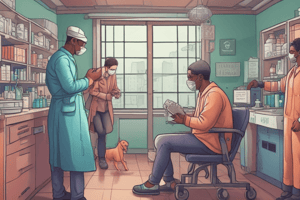Podcast
Questions and Answers
Who is attributed to the modern immunology work in the 1790s?
Who is attributed to the modern immunology work in the 1790s?
- Robert Koch
- Louis Pasteur
- Alexander Fleming
- Edward Jenner (correct)
What is the estimated reduction in global polio incidence due to vaccination?
What is the estimated reduction in global polio incidence due to vaccination?
- Over 70%
- Over 99% (correct)
- Over 80%
- Over 90%
What did Pasteur devise in the 1880s according to the text?
What did Pasteur devise in the 1880s according to the text?
- Vaccine against rabies for humans
- Vaccine against cholera in chickens (correct)
- Vaccine against measles
- Vaccine against smallpox
What was the biggest epidemic ever recorded according to the text?
What was the biggest epidemic ever recorded according to the text?
Which type of vaccine closely resembles normal infection and stimulates the immune response effectively?
Which type of vaccine closely resembles normal infection and stimulates the immune response effectively?
What is the beneficial impact of vaccination that refers to the protection of unimmunized individuals?
What is the beneficial impact of vaccination that refers to the protection of unimmunized individuals?
What is the process of identifying vaccine candidates for clinical trials for MenB using the bacterial genome?
What is the process of identifying vaccine candidates for clinical trials for MenB using the bacterial genome?
Which cells in vaccination express Pattern Recognition Receptors (PRR) like Toll-like receptors?
Which cells in vaccination express Pattern Recognition Receptors (PRR) like Toll-like receptors?
What has led to a pool of unimmunized individuals vulnerable to diseases like measles?
What has led to a pool of unimmunized individuals vulnerable to diseases like measles?
Which type of vaccine is genetically engineered?
Which type of vaccine is genetically engineered?
What are the essential characteristics of vaccines?
What are the essential characteristics of vaccines?
What plays a crucial role in activating T cells and increasing their ability to capture and process antigens?
What plays a crucial role in activating T cells and increasing their ability to capture and process antigens?
What are the emerging challenges in vaccination mentioned in the text?
What are the emerging challenges in vaccination mentioned in the text?
What is the process of identifying candidate genes and expressing them in bacteria to identify vaccine candidates for clinical trials?
What is the process of identifying candidate genes and expressing them in bacteria to identify vaccine candidates for clinical trials?
What is the current UK vaccination schedule designed to protect against?
What is the current UK vaccination schedule designed to protect against?
What has been linked to the handling of bush meat, animal markets, and the food chain?
What has been linked to the handling of bush meat, animal markets, and the food chain?
Flashcards are hidden until you start studying
Study Notes
Vaccines: Types, Challenges, and Current UK Vaccination Schedule
- Essential characteristics of vaccines include effective protection without causing disease or severe side effects, long-lasting protection, correct stimulation of immune response, and affordability for widespread use
- Types of vaccines include live (capable of normal infection and replication), attenuated (reduced ability to cause disease), killed (incapable of infection or replication), extract (derived from disrupted organism), recombinant (genetically engineered), and DNA (naked DNA injected)
- The most effective vaccines have been live or attenuated, as they closely resemble normal infection and stimulate the immune response effectively
- Herd immunity is the beneficial impact of vaccination, but falling vaccination rates have led to a pool of unimmunized individuals vulnerable to diseases like measles
- The current UK vaccination schedule includes DTaP/IPV/Hib, Men C, MMR, BCG, pneumococcal, and flu vaccines at specific ages
- Other UK vaccinations are offered to elderly and at-risk individuals, with constantly changing advice for travel vaccinations
- Reverse Vaccinology for MenB involves sequencing the whole bacterial genome, identifying candidate genes, expressing them in E.coli bacteria, and identifying vaccine candidates for clinical trials
- The emerging challenges in vaccination include potential threats like H5N1 avian flu, SARS coronavirus, and West Nile Virus, with origins of new challenges traced to nonhuman primate origin and animal markets
- Infectious diseases over the last decade have been linked to the handling of bush meat, animal markets, and the food chain
- Dendritic cells in vaccination express Pattern Recognition Receptors (PRR) like Toll-like receptors, which play a crucial role in activating T cells and increasing their ability to capture and process antigens
- The text highlights significant historical outbreaks of infectious diseases like Spanish Flu, Asian Flu, Hong Kong Flu, and the spread of West Nile Virus across the USA
- The changing face of vaccination is evident in the molecular biological advances, emerging challenges, and the constantly evolving nature of travel vaccinations and disease threats
Studying That Suits You
Use AI to generate personalized quizzes and flashcards to suit your learning preferences.




